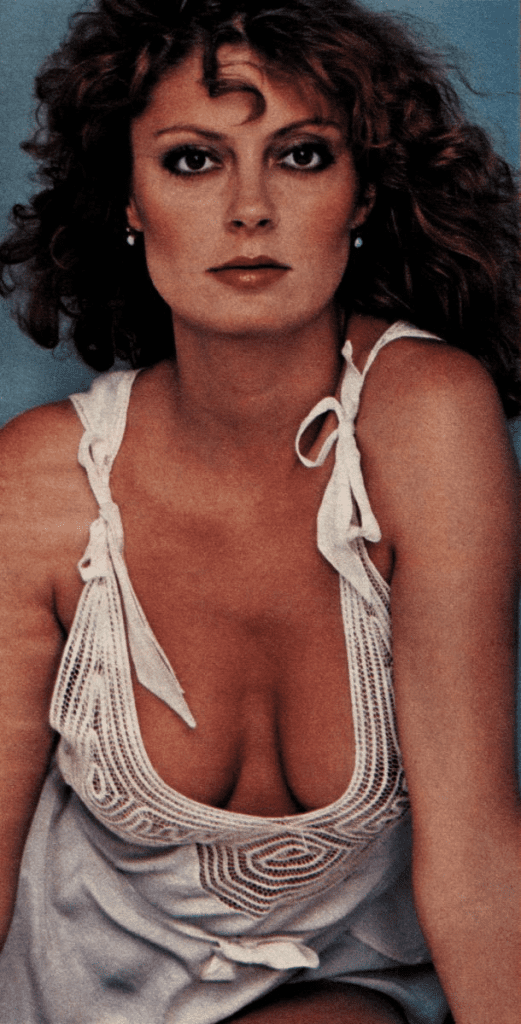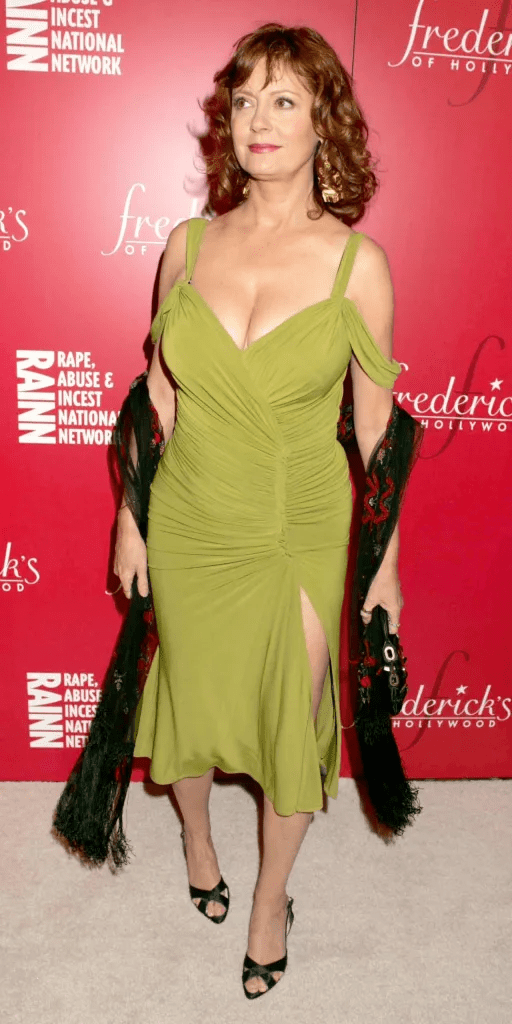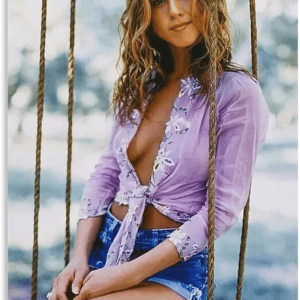
Few actresses have had as profound an impact on both cinema and social activism as Susan Sarandon. With a career spanning over five decades, Sarandon has captivated audiences with her powerful performances, unrelenting passion, and commitment to fighting for justice. Her work in film, television, and theater, combined with her fearless advocacy for human rights, has cemented her as one of Hollywood’s most respected figures.
Early Life: A Star in the Making

Susan Sarandon was born Susan Abigail Tomalin on October 4, 1946, in New York City. She was the eldest of nine children in a Catholic household, raised in Edison, New Jersey. Sarandon’s upbringing was shaped by strong family values and a deep sense of empathy, which would later influence her activism.
She attended The Catholic University of America in Washington, D.C., where she studied drama and earned a Bachelor of Arts in Drama in 1968. Initially unsure about pursuing acting as a career, she explored various creative and artistic interests. However, her path took a decisive turn when she accompanied her then-husband, actor Chris Sarandon, to a casting call. While Chris auditioned, Susan was also encouraged to read for a role—and she landed a part, launching her acting career.
Video:
Susan Sarandon and Kevin Costner enjoy a bath in 1988’s Bull Durham
Breakthrough in Hollywood: The Rise of a Leading Lady
Susan Sarandon’s first notable role came in 1970 when she starred in the film “Joe”, a gritty drama that explored the counterculture movement of the late 1960s. The film’s success brought her early recognition, leading to television and film roles, including appearances in “A World Apart” and “The Great Waldo Pepper”.
However, her true breakthrough came in 1975 with her role as Janet Weiss in the cult classic “The Rocky Horror Picture Show.” The musical horror-comedy became a cultural phenomenon, and Sarandon’s performance as the innocent yet adventurous Janet remains one of her most iconic roles.

Throughout the late 1970s and early 1980s, Sarandon honed her craft, taking on diverse roles that showcased her versatility. Her performances in “Atlantic City” (1980) opposite Burt Lancaster and “The Hunger” (1983) with David Bowie and Catherine Deneuve solidified her status as a leading actress in Hollywood.
The 1980s and 1990s: Critical Acclaim and an Oscar Win
The 1980s saw Sarandon transition into more dramatic roles, earning widespread critical acclaim. In “Bull Durham” (1988), she starred alongside Kevin Costner and Tim Robbins in a romantic comedy-drama that became a box-office hit. Her portrayal of Annie Savoy, a strong and independent baseball groupie, was praised for its charm and wit.

As the 1990s began, Sarandon’s career reached new heights. She received multiple Academy Award nominations for her roles in:
- “Thelma & Louise” (1991): A groundbreaking film in which she played Louise, a fiercely independent woman on the run. The film became a feminist landmark, empowering women and challenging traditional gender roles.
- “Lorenzo’s Oil” (1992): A heartbreaking true story where she played a determined mother fighting for a cure for her son’s rare disease.
- “The Client” (1994): A legal thriller in which she portrayed a compassionate but tough lawyer, earning another Oscar nod.

Her perseverance and talent finally earned her the Academy Award for Best Actress in 1996 for her unforgettable role in “Dead Man Walking”. Playing a nun who provides spiritual guidance to a death-row inmate, Sarandon delivered one of the most powerful performances of her career.
A Voice for Change: Activism and Humanitarian Work
Video:
The Witches of Eastwick (1987) with Susan Sarandon
While Susan Sarandon’s acting achievements are widely celebrated, her unwavering commitment to social activism has been just as impactful. She has been a vocal advocate for human rights, women’s rights, and political reform, using her platform to amplify issues that matter.
- She has campaigned against the death penalty, drawing inspiration from her role in Dead Man Walking.
- She has supported LGBTQ+ rights, championing equality long before it became a mainstream movement in Hollywood.
- She has been a strong advocate for refugees and displaced communities, working with organizations such as UNICEF.
- She has participated in numerous anti-war protests, speaking out against conflicts and government policies she believes are unjust.
Her activism has sometimes been controversial, but Sarandon has never wavered in her convictions. She has consistently used her fame to push for meaningful change, making her one of the most politically engaged figures in Hollywood.

The 2000s and Beyond: Reinventing a Legacy
Entering the 2000s, Susan Sarandon continued to balance blockbuster films with independent cinema, proving her artistic depth.
She starred in “Shall We Dance” (2004) alongside Richard Gere and Jennifer Lopez, a lighthearted romantic drama. She also took on more serious roles, such as in “Elizabethtown” (2005) and “Enchanted” (2007), where she played the villainous Queen Narissa.
Sarandon also found success in television, appearing in critically acclaimed series such as “Feud” (2017), where she played Bette Davis in the dramatic retelling of her legendary rivalry with Joan Crawford. The role earned her a Primetime Emmy Award nomination, further proving her ability to excel in any format.
Present-Day Influence: A Living Legend

Now in her seventies, Susan Sarandon continues to take on new challenges, both on-screen and off. She remains active in film and television, recently starring in “The Meddler” (2015), “Ride the Eagle” (2021), and the upcoming “Blue Beetle” (2023).
Her influence extends beyond Hollywood. She remains an outspoken advocate for progressive causes, frequently attending rallies and using social media to spread awareness about critical issues.
Despite facing criticism for her political views, Sarandon remains steadfast in her beliefs, demonstrating the same fearless attitude that has defined both her career and activism.
A Lasting Impact on Cinema and Society
Susan Sarandon’s legacy is one of talent, courage, and an unwavering commitment to justice. She has defied industry norms, embraced bold roles, and used her platform for the greater good.

Her ability to transition seamlessly from romantic leads to powerful dramas, from independent films to Hollywood blockbusters, proves her versatility as an actress. Simultaneously, her outspoken nature and dedication to activism make her an inspiration for those who believe in fighting for change.
As we celebrate her contributions to cinema and society, one thing remains clear—Susan Sarandon is a force to be reckoned with, and her influence will continue to shape the world for generations to come.
Here are some great photos of her:












